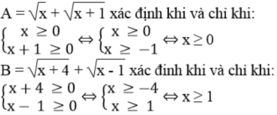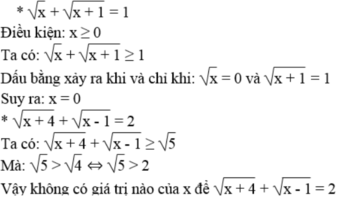Hãy nhập câu hỏi của bạn vào đây, nếu là tài khoản VIP, bạn sẽ được ưu tiên trả lời.


1: Để A>0 thì x-1<0
hay x<1
Kết hợp ĐKXĐ, ta được: \(0\le x< 1\)
1) Để A > 0 thì:
\(x-1< 0\Leftrightarrow x< 1\)
\(\Rightarrow0\le x< 1\) và \(x\ne1\)
2) \(A=\dfrac{\sqrt{x}+1}{\sqrt{x}-1}=1+\dfrac{2}{\sqrt{x}-1}\)
Để A<1 thì \(\dfrac{2}{\sqrt{x}-1}< 0\)
\(\Rightarrow\sqrt{x}-1< 0\Leftrightarrow\sqrt{x}< 1\)
Mà x\(\ge0,x\ne1\)
\(\Rightarrow0\le x< 1\)

d. Áp dụng BĐT Caushy Schwartz ta có:
\(x+y+\dfrac{1}{x}+\dfrac{1}{y}\le x+y+\dfrac{\left(1+1\right)^2}{x+y}=x+y+\dfrac{4}{x+y}\le1+\dfrac{4}{1}=5\)
-Dấu bằng xảy ra \(\Leftrightarrow x=y=\dfrac{1}{2}\)

\(A=\dfrac{x^2+x}{x^2-2x+1}:\left(\dfrac{x+1}{x}-\dfrac{1}{1-x}+\dfrac{2-x^2}{x^2-x}\right)\left(1\right)\)
a) A xác định \(\Leftrightarrow\left\{{}\begin{matrix}x\ne0\\x\ne1\end{matrix}\right.\)
\(\left(1\right)\Rightarrow A=\dfrac{x\left(x+1\right)}{\left(x-1\right)^2}:\left(\dfrac{x+1}{x}+\dfrac{1}{x-1}+\dfrac{2-x^2}{x\left(x-1\right)}\right)\)
\(\Rightarrow A=\dfrac{x\left(x+1\right)}{\left(x-1\right)^2}:\left(\dfrac{\left(x+1\right)\left(x-1\right)+x+2-x^2}{x\left(x-1\right)}\right)\)
\(\Rightarrow A=\dfrac{x\left(x+1\right)}{\left(x-1\right)^2}:\left(\dfrac{x^2-1+x+2-x^2}{x\left(x-1\right)}\right)\)
\(\Rightarrow A=\dfrac{x\left(x+1\right)}{\left(x-1\right)^2}:\left(\dfrac{x+1}{x\left(x-1\right)}\right)\)
\(\Rightarrow A=\dfrac{x\left(x+1\right)}{\left(x-1\right)^2}.\dfrac{x\left(x-1\right)}{x+1}=\dfrac{x^2}{x+1}\)
b) Để \(A=-\dfrac{1}{2}\)
\(\Leftrightarrow\dfrac{x^2}{x+1}=-\dfrac{1}{2}\left(x\ne-1\right)\)
\(\Leftrightarrow2x^2=-\left(x+1\right)\)
\(\Leftrightarrow2x^2+x+1=0\)
\(\Delta=1-8=-7< 0\)
Nên phương trình trên vô nghiệm \(\left(x\in\varnothing\right)\)
c) Để \(A< 1\)
\(\Leftrightarrow\dfrac{x^2}{x+1}< 1\)
\(\Leftrightarrow x^2< x+1\left(x\ne-1\right)\)
\(\Leftrightarrow x^2-x-1< 0\)
\(\Leftrightarrow x^2-x+\dfrac{1}{4}-\dfrac{1}{4}-1< 0\)
\(\Leftrightarrow\left(x-\dfrac{1}{2}\right)^2-\dfrac{5}{4}< 0\)
\(\Leftrightarrow\left(x-\dfrac{1}{2}\right)^2< \dfrac{5}{4}\)
\(\Leftrightarrow-\dfrac{\sqrt[]{5}}{2}< x-\dfrac{1}{2}< \dfrac{\sqrt[]{5}}{2}\)
\(\Leftrightarrow\dfrac{-\sqrt[]{5}+1}{2}< x< \dfrac{\sqrt[]{5}+1}{2}\)
d) Để A nguyên
\(\Leftrightarrow\dfrac{x^2}{x+1}\in Z\)
\(\Leftrightarrow x^2⋮x+1\)
\(\Leftrightarrow x^2-x\left(x+1\right)⋮x+1\)
\(\Leftrightarrow x^2-x^2+x⋮x+1\)
\(\Leftrightarrow x⋮x+1\)
\(\Leftrightarrow x-x-1⋮x+1\)
\(\Leftrightarrow-1⋮x+1\)
\(\Leftrightarrow x+1\in\left\{-1;1\right\}\)
\(\Leftrightarrow x\in\left\{-2;0\right\}\left(x\in Z\right)\)

a: \(A=\dfrac{\sqrt{x}+1}{\sqrt{x}-1}+\dfrac{\sqrt{x}-1}{\sqrt{x}+1}-\dfrac{3\sqrt{x}+1}{\sqrt{x}-1}\)
\(=\dfrac{-2\sqrt{x}\left(\sqrt{x}+1\right)+x-2\sqrt{x}+1}{\left(\sqrt{x}-1\right)\left(\sqrt{x}+1\right)}\)
\(=\dfrac{-2x-2\sqrt{x}+x-2\sqrt{x}+1}{\left(\sqrt{x}-1\right)\left(\sqrt{x}+1\right)}\)
\(=\dfrac{-x-4\sqrt{x}+1}{x-1}\)

a: ĐKXĐ: x<>0; x<>1
\(P=\dfrac{x\left(x+1\right)}{\left(x-1\right)^2}:\dfrac{x^2-1+x+2-x^2}{x\left(x-1\right)}\)
\(=\dfrac{x\left(x+1\right)}{\left(x-1\right)^2}\cdot\dfrac{x\left(x-1\right)}{x+1}=\dfrac{x^2}{x-1}\)
b: |2x+1|=3
=>x=1(loại); x=-2(nhận)
Khi x=-2 thì P=4/-3=-4/3
c: P=-1/2
=>x^2/x-1=-1/2
=>2x^2=-x+1
=>2x^2+x-1=0
=>2x^2+2x-x-1=0
=>(x+1)(2x-1)=0
=>x=1/2; x=-1

Bài 1:
a: \(Q=\left(\dfrac{\sqrt{x}+2}{x+2\sqrt{x}+1}-\dfrac{\sqrt{x}-2}{x-1}\right)\left(x+\sqrt{x}\right)\)
\(=\dfrac{x+\sqrt{x}-2-x+\sqrt{x}+2}{\left(\sqrt{x}+1\right)^2\cdot\left(\sqrt{x}-1\right)}\cdot\sqrt{x}\left(\sqrt{x}+1\right)\)
\(=\dfrac{2x}{x-1}\)

9.
\(A>1\Leftrightarrow\dfrac{\sqrt{x}-2}{\sqrt{x}-1}>1\)
\(\Leftrightarrow\dfrac{\sqrt{x}-2}{\sqrt{x}-1}-1>0\)
\(\Leftrightarrow\dfrac{\sqrt{x}-2-\sqrt{x}+1}{\sqrt{x}-1}>0\)
\(\Leftrightarrow\dfrac{-1}{\sqrt{x}-1}>0\)
\(\Leftrightarrow\sqrt{x}-1< 0\)
\(\Leftrightarrow x< 1\)
Kết hợp với điều kiện giả thiết.
10.
\(P< 1\Leftrightarrow\dfrac{\sqrt{x}+1}{\sqrt{x}-1}< 1\)
\(\Leftrightarrow\dfrac{\sqrt{x}+1}{\sqrt{x}-1}-1< 0\)
\(\Leftrightarrow\dfrac{\sqrt{x}+1-\sqrt{x}+1}{\sqrt{x}-1}< 0\)
\(\Leftrightarrow\dfrac{2}{\sqrt{x}-1}< 0\)
\(\Leftrightarrow\sqrt{x}-1< 0\)
\(\Leftrightarrow x< 1\)
Kết hợp với điều kiện giả thiết.

a: Ta có: \(M=\dfrac{x^2+x}{x^2-2x+1}:\left(\dfrac{x+1}{x}-\dfrac{1}{1-x}+\dfrac{2-x^2}{x^2-x}\right)\)
\(=\dfrac{x\left(x+1\right)}{\left(x-1\right)^2}:\dfrac{x^2-1+x+2-x^2}{x\left(x-1\right)}\)
\(=\dfrac{x\left(x+1\right)}{\left(x-1\right)^2}\cdot\dfrac{x\left(x-1\right)}{x+1}\)
\(=\dfrac{x^2}{x-1}\)
b: Để M>1 thì M-1>0
\(\Leftrightarrow\dfrac{x^2-x+1}{x-1}>0\)
\(\Leftrightarrow x-1>0\)
hay x>1


Ta có (x - 1)5 = (1 - x)6
<=> (x - 1)5 = (x - 1)6
<=> (x - 1)6 - (x - 1)5 = 0
<=> (x -1)5(x - 1 - 1) = 0
<=> (x - 1)5(x - 2) = 0
<=> \(\orbr{\begin{cases}\left(x-1\right)^5=0\\x-2=0\end{cases}}\Leftrightarrow\orbr{\begin{cases}x-1=0\\x-2=0\end{cases}}\Leftrightarrow\orbr{\begin{cases}x=1\\x=2\end{cases}}\)
Vậy \(x\in\left\{1;2\right\}\)là giá trị cần tìm